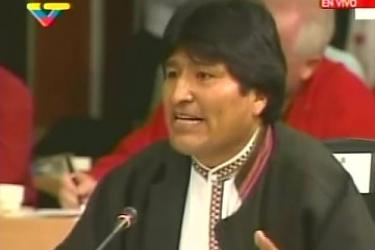latin america

Translated by Federico Fuentes
Cumaná, April 17, 2009
The heads of state and governments of Bolivia, Cuba, Dominica, Honduras, Nicaragua and Venezuela -- member countries of the Bolivarian Alternative for the Peoples of Our Americas (ALBA) -- consider that the proposed Declaration of the 5th Summit of the Americas is insufficient and unacceptable for the following reasons:

Evo Morales: `I declare myself Marxist ... now let the OAS expel Bolivia'
During his intervention at the seventh ALBA Summit, Bolivia's president Evo Morales recalled the 1962 documents of the Organisation of American States (OAS) that resulted in Cuba being expelled from the organisation, and outlined the importance of reflecting on the motives of that expulsion.
Luis Bilbao: The grand duel -- At the Fifth Summit of the Americas, a crucial battle is to be waged
By Luis Bilbao, translated by Gonzalo Villanueva for Links International Journal of Socialist Renewal.
Bolivia's ‘communitarian socialism’

Banner supporting a `yes' vote in the January 25, 2009, constitutional referendum.
By Federico Fuentes
April 1, 2009 -- The historic enactment of Bolivia’s new constitution that grants unprecedented rights to the country’s indigenous majority, approved by over 61% of the vote on January 25, represented the beginning of “communitarian socialism”, according to President Evo Morales.
This was not the first time Bolivia’s first indigenous president had raised the concept of “communitarian socialism”. In his April 2008 speech to the United Nations, Morales spoke of the need for “a communitarian socialism in harmony with Mother Earth”.
While Morales’s political party is officially known as Movement Towards Socialism–Political Instrument for the Sovereignty of the Peoples (MAS-IPSP), it was originally simply IPSP. Blocked from registering itself as an electoral party, the IPSP took up the offer of the then-existing MAS party to use its registered name to run in elections.
La revolucion energetica: Cuba's energy revolution

By Laurie Guevara-Stone, photos by Mario Alberto Arrastia Avila
April 2, 2009 -- A new revolution is sweeping the island of Cuba, which is making massive progress on energy efficiency and renewable generation. Indeed, such is the success of the two-year old program on this small island of 11 million people, that many other countries could learn from its efforts to be energy independent and curb climate change.
Atilio Borón: From infinite war to infinite crisis

By Atilio Borón[*], translated by Machetera, Scott Campbell, Christine Lewis Carroll and Manuel Talens
March 25, 2009 -- Machetera/Tlaxcala -- Some thoughts on the current capitalist crisis, its probable “solutions” and the role that a socialist option might play in the present juncture.
El Salvador's FMLN: The road to victory and beyond

By the Committee in Solidarity with the People of El Salvador (CISPES)
March 24, 2009 -- Starting at 7am on Sunday, March 15, Salvadorans headed en masse to the polls to cast their ballots for the future president; by 9:30pm Mauricio Funes, presidential candidate of the Farabundo Martí National Liberation Front (FMLN), pronounced himself president-elect of El Salvador—the very first leftist head of state in the country’s history.

World at a Crossroads: Fighting for socialism in the 21st Century
Easter 2009, April 10-12, Sydney
Venue: Sydney Girls High School
World At A Crossroads is a conference that brings together hundreds of socialists, progressive activists and Marxist thinkers from around Australia, Latin America, Asia-Pacific and North America in dozens of panel presentations and workshops dealing with the urgent questions that confront us all: war, imperialism, food security, racism, workers' rights, sexism, the media and culture. Feature sessions and streams will include:

By Federico Fuentes
March 21, 2009 -- “This government is here to protect the people, not the bourgeoisie or the rich”, proclaimed Venezuelan President Hugo Chavez on February 28, as he ordered soldiers to take over two rice-processing plants owned by Venezuelan food and drink giant Empresas Polar.
The move was made in order to ensure that the company was producing products subjected to the government-imposed price controls that aim to protect the poor from the affects of global price rises and inflation.
Under Venezuelan law, companies that can produce basic goods regulated by price controls must guarantee that 70-95% of their products are of the regulated type.
“They’ve refused 100 times to process the typical rice that Venezuelans eat”, said Chavez. “If they don’t take me seriously, I’ll expropriate the plants and turn them into social property.”
PSUV document: Crack in the accumulation of world capitalism (march towards the global depression)
Venezuela: Confronting capitalism's crisis with more revolution
By Manuel Sanchez
Caracas, March 14, 2009 -- In some countries, the severe crisis of capitalism has resulted in a realignment of respective governments with the imperialist powers — and the adoption of different forms of cut backs that affect the living conditions of the majority.
In the Venezuela, the opposite is occurring.
Before and after the victory for the pro-revolution forces in the referendum on February 15, 2009, to allow elected officials to stand for re-election more than once, the decision to push forward with the transition to socialism was ratified.
The world economic situation has also undoubtedly hit hard in Venezuela. The revolutionary government has already resolved to eliminate “all expenses that are not absolutely indispensable”.
But these austerity measures, far from adversely affecting the course of the revolution that seeks to transform the country, are favouring it. To the average politically trained eye, this has been evident since September 2008. President Hugo Chavez explicitly warned of this in this annual message to the nation on January 13.